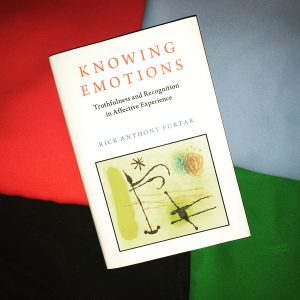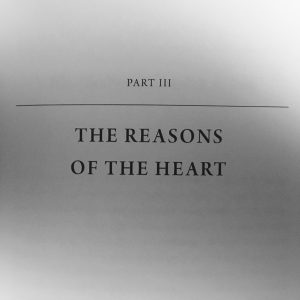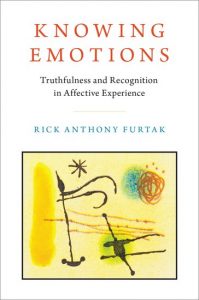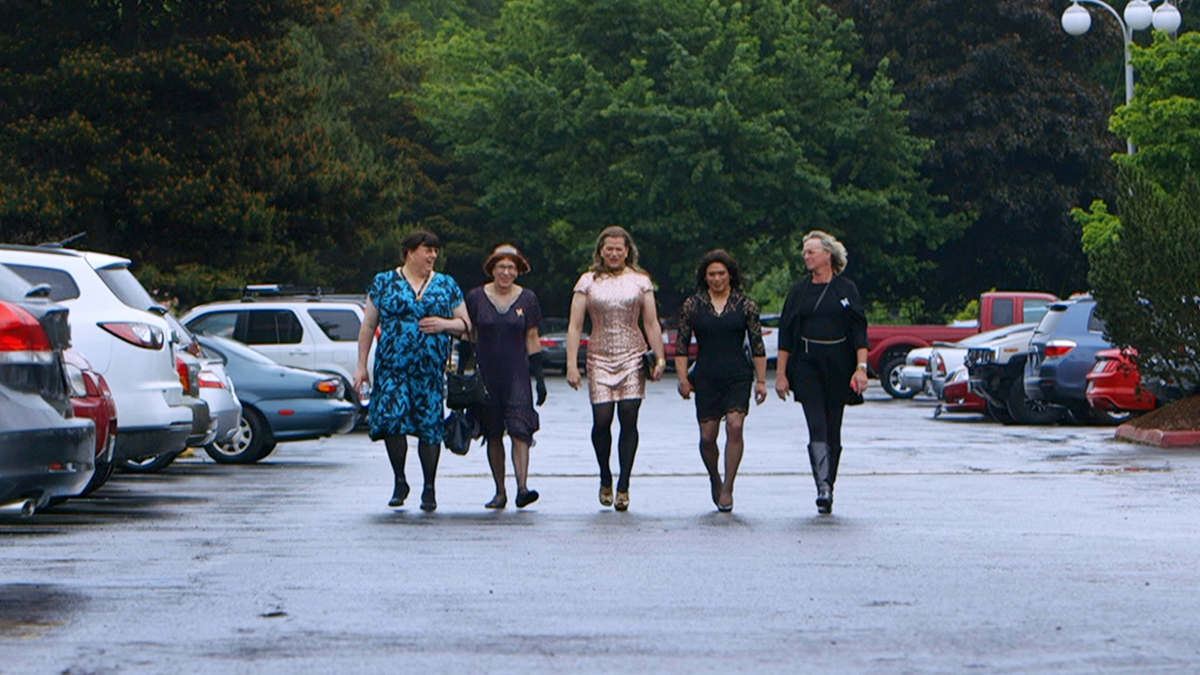"This group of women have all lived as men... Everything is in the wrong place, and everything is in the wrong size and shape, and it sucks to try to be a woman when you’ve had like 60 years of testosterone going through your veins."—Jessica Dimmock, in our interview about her documentary The Convention.
Building the Bridge Beneath Our Feet A review of Knowing Emotions by Rick Anthony Furtak
 In our peculiar age of postmodern equivocation, alternative facts, post-truth, and science pitted against gut-knowledge, we find ourselves essentially overwhelmed by enormous bodies of contrary information, and an inability to derive from it all wisdom. For all the great strides we’ve made in rationalism and reason, as a species we seem to be irrevocably ruled by our emotions. Is this a flaw for us to overcome with science? Or, is it as Blaise Pascal said, that the heart has its reasons, which are entirely unknown to mere reason? In the new book Knowing Emotions: Truthfulness and Recognition in Affective Experience, Rick Anthony Furtak pulls apart the mechanics of our emotions to explore the truths they reveal.
In our peculiar age of postmodern equivocation, alternative facts, post-truth, and science pitted against gut-knowledge, we find ourselves essentially overwhelmed by enormous bodies of contrary information, and an inability to derive from it all wisdom. For all the great strides we’ve made in rationalism and reason, as a species we seem to be irrevocably ruled by our emotions. Is this a flaw for us to overcome with science? Or, is it as Blaise Pascal said, that the heart has its reasons, which are entirely unknown to mere reason? In the new book Knowing Emotions: Truthfulness and Recognition in Affective Experience, Rick Anthony Furtak pulls apart the mechanics of our emotions to explore the truths they reveal.
The history of emotions educates us quickly that, despite the universality of human beings having emotions, there are differences both individually and culturally in the way they’re experienced, understood, and expressed in words. Considering the significant role they play in our lives—leading us away from danger, or towards it—it’s only natural that emotions are a serious field of study. We’ve used neuroscience, biology, psychology and therapy, philosophy and the arts to try to reach a better understanding of what emotions are, and seem to get closer, only to remain as clumsy in our handling of them as when we began our search. Given such tenuousness, what can emotions reveal to us about truth?
Furtak opens with an assertion: “Human emotions are not merely physiological disturbances: rather, they are experiences through which we can apprehend important truths about ourselves and about the world.” Hedging quickly, he clarifies that “this is not to say that every emotion succeeds at revealing something true,” but it is through our emotions that we are guided towards something that is usefully true to and about ourselves.
In short, they tell us who we are.

In my lecture at the Between Realities symposium (2017), I argued that reality is a matter of our own construction, and so, “to know your reality, know your emotions.” Our selves are formed through various factors of our unique biology, the environment into which we’re born, and the experiences we have throughout our lifetimes. These selves are confronted with events of the world, and we react to them positively, negatively or neutrally. Those reactions indicate not only what you value as good or bad, but what you, as a selective and finite being, even notice. “Emotions are especially revelatory of a person’s own distinctive point of view—which is shaped by our temperament, our biological experience, and our whole conception of existence,” Furtak argues. “Indeed, it is through our emotions most of all that we have a sense of reality and an understanding of what life means.”
 This can sound all very abstract, given the tendency of emotions to feel both involuntary and inevitable, but it’s not a matter to gloss over: our emotions determine what is worthy of attention and what is not, and this selection and filtration defines for us our reality. Run a mental inventory of the various disagreements and total misunderstandings you have with others for an understanding of the urgent salience of this point. Furtak drives the point home: “What is at issue in our affective life is nothing less than our sense of reality.”
This can sound all very abstract, given the tendency of emotions to feel both involuntary and inevitable, but it’s not a matter to gloss over: our emotions determine what is worthy of attention and what is not, and this selection and filtration defines for us our reality. Run a mental inventory of the various disagreements and total misunderstandings you have with others for an understanding of the urgent salience of this point. Furtak drives the point home: “What is at issue in our affective life is nothing less than our sense of reality.”
Our grip on reality becomes even wobblier if we consider what Lisa Feldman Barrett says in her 2017 TED talk: “Emotions are guesses.” She explains that the brain constructs its best guess of what’s happening, and what it means, based on what it has encountered before. “Your brain does not react to the world,” she says. “Using past experience, your brain predicts and constructs your experience of the world.” Furtak describes emotions in a resonate way as “felt recognitions.” Through this process, we may experience some situation as “recognizable” to us, and predict that it’s a threat or not, though it is in fact unknown and unpredictable. New information is continually added to our knowledge base for better prediction-making, but the fact remains that we continue to construct our reality based on guesses.
So, we’re building the bridge beneath our feet. But, again, this gives room to appreciate the kind of truth conveyed by our emotions, a truth which Furtak argues is not accessible through any other of our means, such as reason. “That we are loving or caring beings structures how the world seems to us—what seems real and significant, what appears to be possible, as well as what arouses our attention and moves us to respond,” Furtak writes. “Taking notice of another person’s suffering, for example, requires more than just pointing one’s eyes at him while he is located in a well-lit place: it also requires that we view him with the attention and concern that highlight whatever we love and care about.”
Without emotion, we would not be moved to care for some things more than others, and thus would be deprived of an ability to evaluate any experiences as real and meaningful. Furtak writes: “In the absence of love, nothing would hold any significance for us.” This is not because “our emotions give meaning to life, or that our lives are meaningful because we have emotions,” he clarifies. “More precisely, it is through our emotions that we human beings encounter meaning or significance within our lives.” By being mindful of what we respond to, we’re better able to make a map of what we bestow with value, and through the negative space, we may start to see what we don’t value sufficiently to acknowledge its existence. It’s a personalized landscape.

This is where all the pieces start to fit together: We’re constructing reality on the fly, based on a comparison of what we’re perceiving against what we’ve experienced before, seeking a felt recognition (emotion) to predict whether something will feel good or not. Because we’re building reality as we go, we reach this affective reaction before a conscious recognition. Over time, by forming a body of patterns that feel good, we define significance and meaning, which are essentially narratives that make that on-the-fly reality-building somewhat less taxing.
All of this feels quite cold, though, doesn’t it? It somehow escapes the euphoric bliss of falling in love, the profound beauty of joyful laughter, the crushing sickness of depression. And that’s kind of the point. Deconstructing emotions is an effort of cognition. We can think about emotions, we can write or reason about them, but when it comes to feeling them, there’s something else entirely at stake. The poet e.e. cummings wrote, “love is a deeper season than reason,” while M. Scott Peck asserts in his book The Road Less Travelled, “Love is not a feeling,” describing it instead as an action, an activity. In Knowing Emotions, Furtak concludes: “The emotions constitute a mode of apprehension that cannot be classified as either cognitive or bodily, because it is both at once.”

In the Human Manifesto, the authors assert that we are “animals of meaning,” declaring it to be the most important aspect in human life, as it allows us to understand reality, think further about it, and act within it. They declare, in language that aligns with Furtak, its origin: “Meaning emerges when our entire body (including the brain) interacts with the world as it is, or actualizes new realities.”
For those who take the time to be mindful of their emotions, to own them rather than to be owned by them, this rings true. While Buddhist lines of thought argue that you are not your emotions, we must pair this with what Lisa Feldman Barrett asserts: “Emotions that seem to happen to you are actually made by you.” Yes, it can be healthy to put a bit of distance between ourselves and our emotions, and perhaps the way of doing so is through the recognition that they are our creations. So, it is with good reason that emotions seem to overtake us, consuming our minds and bodies. It is a small effort of giving birth.
In Knowing Emotions, Furtak provides a compelling argument that our emotions are the source of invaluable and irreplaceable truth about ourselves and what truly matters to us. Because we feel, we have desire, we have intentions toward the outside world, and we perceive a sufficient stake to defend those desires and intentions, as well as ourselves. Our emotions don’t always steer us correctly—take, for example, phobias, or the case of mood-based emotional reactions, or physiological states that we misread emotionally—but as we get better at reading ourselves, particularly in light of understanding that an emotion is a whole-body creation, we’re better able to understand their message. Knowing our emotions is essentially knowing the world that we’re building.
The heart does have its reasons. While the sciences may draw us nearer to objective truths, without our emotions, we simply wouldn’t care.
 Knowing Emotions: Truthfulness and Recognition is available from Oxford University Press.
Knowing Emotions: Truthfulness and Recognition is available from Oxford University Press.



